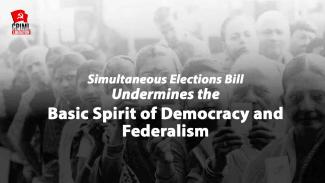
On December 17, 2024, the Modi government introduced two bills aimed at forwarding the undemocratic and unconstitutional Simultaneous Elections idea. The Constitution 129th Amendment Bill 2024 and The Union Territories Laws Amendment Bill 2024 were introduced in in Lok Sabha. CPIML Lok Sabha MPs Raja Ram Singh and Sudama Prasad noted that the ‘One Nation, One Election’ or Simultaneous Elections proposal is undemocratic, and this pet idea of the BJP undermines the basic spirit of democracy and federalism that constitutes the lifeblood of the Constitution. Today, in the name of ‘One Nation, One Election’ the BJP wants to set the political clock back and enforce a regimentation of the polity through constitutional amendments.
Speaking about the ONOE proposal, CPIML General Secretary Dipankar Bhattacharya said that driving this project of course is the Sangh-BJP scheme of over-centralisation of power and systematic weakening of India's diverse culture, plural politics and federal framework. By clubbing all elections together, the Modi government seeks to rob elections of their distinct contexts and limit the political choices of the people. Federal India offers the most vibrant opposition and determined resistance to the Modi government's Hindi-Hindu-Hindustan paradigm as can be seen from the growing cultural and political churnings in states beyond the Hindi heartland (as well as increasingly within it). 'One Nation, One Election' is a formula to curb those churnings and subject democratic India to the imperial designs of a fascist regime.
“This design is of a piece with the whole of range of attempts going on in the spheres of law, governance and constitutional architecture to reduce empowered citizenship to loyal subjecthood and enslave India in a fascist straitjacket. India must defeat this design by all means,” added Com. Dipankar.
CPIML in a statement highlighted that assembly and Parliament elections have their own specific contexts as do the panchayat and municipal elections. Clubbing elections together for logistical considerations will mean stripping Assembly elections of their autonomous domain and making them subordinated to the central context. The assumption that holding simultaneous elections would make for logistical convenience and financial savings is not backed by any credible study or analysis of election expenses or logistical arrangements. Furthermore, as per the Law Commission’s 2018 draft report on simultaneous elections about 3586 crores was the cost incurred by the ECI on the 2014 elections (para 2.10). To put this in perspective, since the BJP came to power at the Centre in 2014, the Union government has spent Rs. 3,260.79 crore on advertising in electronic media and Rs. 3,230.77 crore on advertising in print media. If money is truly to be saved, the scope clearly lies elsewhere. Expenditure cannot be made a prime consideration in pursuing the core principles of democracy.
In a bid to justify the wide-ranging amendments to the Constitution to facilitate simultaneous elections, the entire ONOE proposal attempts to play down the right to vote, and the right to elect in Indian jurisprudence. Parliamentary democracy, multi-party system and free and fair elections are all part of the basic structure of the Constitution.
Charu Bhawan, U-90, Shakarpur, Delhi 110092
Phone: +91-11-42785864 | Fax:+91-11-42785864 | +91 9717274961
E-mail: info@cpiml.org







